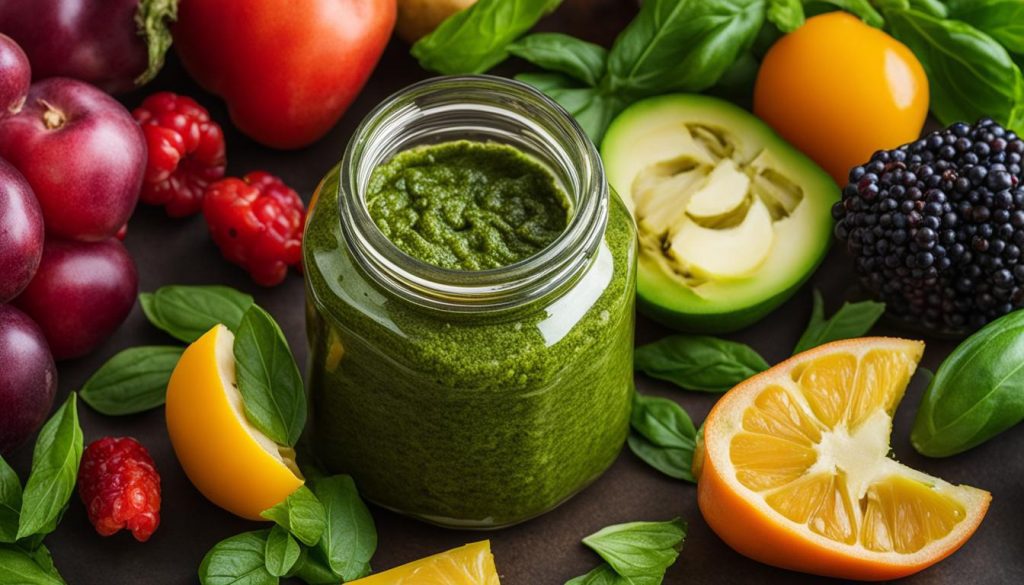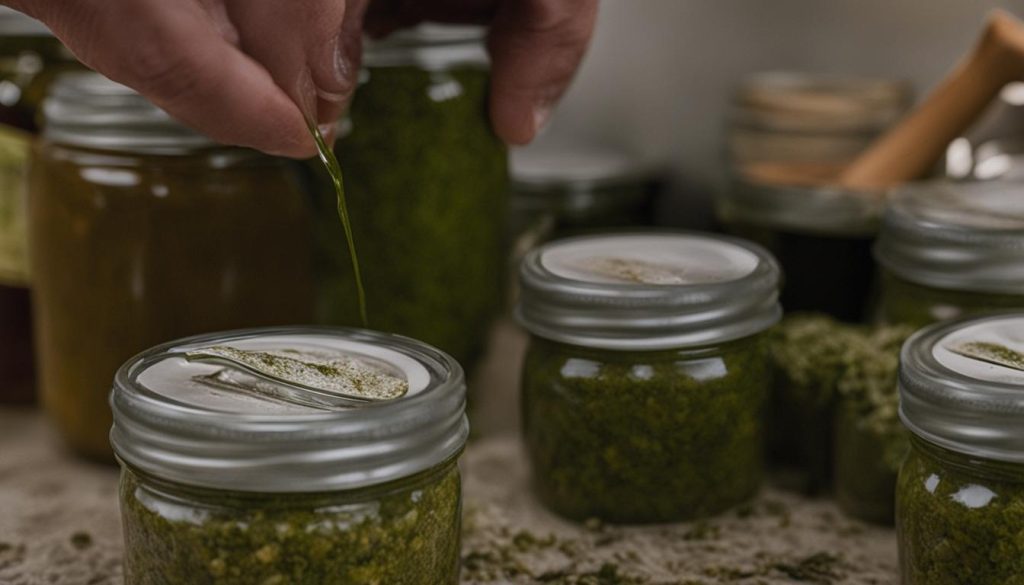When it comes to delicious and versatile sauces, pesto takes the spotlight. Made from fresh basil, garlic, olive oil, Parmesan cheese, and pine nuts, this staple in Italian cuisine offers not only a burst of flavor but also a range of health benefits.
Pesto is a powerhouse of antioxidants, thanks to its key ingredients like basil, olive oil, and nuts. These antioxidants help protect our cells from oxidative damage, promoting overall health and well-being. The combination of olive oil and nuts in pesto also provides a healthy dose of unsaturated fats, which have been known to benefit heart health.
But the health benefits of pesto don’t stop there. The individual ingredients in pesto, such as garlic and basil, have been linked to lower blood pressure, cholesterol levels, and even a reduced risk of chronic diseases like heart disease, diabetes, and certain types of cancer.
Health Benefits of Pesto Unlocked
- Pesto is a versatile sauce made from fresh basil, garlic, olive oil, Parmesan cheese, and pine nuts.
- It is rich in antioxidants that help protect cells from oxidative damage.
- Pesto contains healthy fats, mainly unsaturated fats from olive oil and nuts, which have heart health benefits.
- The individual ingredients in pesto, such as garlic and basil, have been linked to lower blood pressure, cholesterol, and the risk of chronic diseases.
- Incorporating pesto into your diet can offer both culinary enjoyment and potential health benefits.
What is Pesto?
Pesto is a type of uncooked sauce that originated in Genoa, Italy. The word “pesto” means “to pound or crush,” reflecting the traditional method of making pesto by pounding fresh basil, garlic, olive oil, Parmesan cheese, and pine nuts using a mortar and pestle. However, nowadays, pesto can be easily made using a food processor or blender.
The classic pesto ingredients include fresh basil, garlic, salt, extra-virgin olive oil, aged Parmesan and/or Pecorino cheese, and pine nuts. However, pesto can also be made from other leafy greens like spinach, arugula, or herbs like parsley or cilantro. It can even be made from sun-dried tomatoes, olives, or roasted red peppers. The ingredients can be varied based on personal preferences and dietary restrictions.
Homemade pesto allows for customization and control over the ingredients. You can experiment with different herbs, nuts, and variations to suit your taste preferences and dietary needs.
Nutritional Value of Pesto
Pesto is a delicious sauce that adds flavor to a variety of dishes. While it may be high in calories and fat, it offers several nutritional benefits. Let’s take a closer look at the nutritional value of pesto.

- A 1/4-cup serving of pesto contains approximately 263 calories.
- It has 24 grams of fat, which mostly comes from heart-healthy unsaturated fats.
- There are 6 grams of protein and 6 grams of carbohydrates in a serving.
- Pesto is also a good source of minerals like calcium.
It’s important to note that the exact nutrient content may vary depending on the specific ingredients used and the serving size. However, most of the fats in pesto come from olive oil and nuts, which are rich in antioxidants. These antioxidants provide protective effects against oxidative damage in the body.
While pesto may be higher in calories and fat, it can still be a nutritious addition to your meals. When consumed in moderation and as part of a balanced diet, pesto can be enjoyed while providing some essential nutrients and antioxidants.
Health Benefits of Pesto
Pesto offers several health benefits that make it a valuable addition to your diet. Not only is it a delicious sauce, but it also supports your overall well-being. When you enjoy pesto, you’re benefiting from the powerful combination of its ingredients, including basil, olive oil, and nuts.
The Mediterranean diet, of which pesto is a key component, has been associated with a lower risk of chronic diseases like heart disease, diabetes, and certain types of cancer. This highlights the potential health properties of pesto and its positive impact on your overall health.
Basil, a primary ingredient in pesto, is known for its rich antioxidant content. Antioxidants help protect your cells from oxidative damage caused by free radicals. Olive oil, another essential ingredient in pesto, is a source of healthy fats and antioxidants that can improve your blood pressure, blood sugar, and cholesterol levels.
Benefits of Specific Ingredients
- Garlic, commonly found in pesto, has been shown to lower blood pressure and cholesterol levels. It may also have antimicrobial properties and potential cancer-fighting effects.
- Basil, with its antioxidants and essential oils, may help reduce blood sugar levels and prevent the growth of foodborne pathogens.
By incorporating pesto into your diet, whether it’s used as a sauce, spread, or condiment, you can enjoy its culinary delight while reaping the potential health benefits.
Downsides of Pesto
While pesto offers numerous health benefits, it’s important to be aware of a few potential downsides.
Nut Allergies: Many types of pesto contain pine nuts or other tree nuts, which can be problematic for individuals with nut allergies. If you have a nut allergy, always check the ingredients before consuming pesto to avoid any adverse reactions.
Storage and Foodborne Illness Risk: Improper storage or consuming spoiled pesto can pose a risk of foodborne illness. To ensure food safety, fresh homemade pesto should be stored in an airtight container in the refrigerator and used within a week. If you need to store it for a longer period, freezing is a suitable option. Keep in mind that store-bought pesto usually contains preservatives or has been pasteurized, allowing for longer pantry storage after opening. However, homemade pesto or pesto from the refrigerator section should be refrigerated and used within a specific time frame to minimize the risk of foodborne illnesses.

Making and Enjoying Pesto
Making pesto at home not only allows for customization but also provides control over the ingredients used. It’s an opportunity to experiment with different herbs, nuts, and variations that suit your taste preferences and dietary needs. To make homemade pesto, you can use a food processor or blender to blend fresh basil, garlic, nuts, cheese, and olive oil until smooth and creamy.
Pesto lends itself to a variety of uses in your kitchen. It works beautifully as a sauce for pasta dishes, adding a burst of flavor and freshness. You can also use it as a topping for pizza or as a spread in sandwiches to elevate their taste. Additionally, pesto makes a versatile condiment that complements the flavors of various dishes. One useful trick is to thin out pesto with starchy pasta water, allowing you to coat noodles evenly while using less pesto.
If you’re looking for inspiration, there’s an abundance of healthy pesto recipes available online. These recipes incorporate pesto into nutritious meals that will satisfy your taste buds and nourish your body. For example, you can try zucchini noodles with pesto and chicken for a light and flavorful dinner option. Alternatively, a pesto, mozzarella, and egg breakfast sandwich will kickstart your day with a burst of deliciousness.
Conclusion
Pesto is not only a delicious sauce that adds flavor to your dishes, but it also offers a range of health benefits that can enhance your well-being. By incorporating pesto into your diet, you can enjoy the vibrant flavors while reaping the potential advantages it provides.
Pesto is packed with essential nutrients, antioxidants, and healthy fats that are beneficial for your body. It has been linked to a lower risk of chronic diseases, including heart disease, diabetes, and certain types of cancer, making it a valuable addition to a healthy lifestyle. However, it’s essential to be mindful of your ingredients and portion sizes, especially if you have any allergies or are watching your sodium or calorie intake.
Whether you choose to make pesto at home or opt for store-bought options, there are numerous uses for this versatile sauce. Homemade pesto allows for customization, enabling you to experiment with different herbs, nuts, and ingredients that suit your taste preferences and dietary needs. On the other hand, store-bought pesto offers convenience, allowing you to enjoy the flavors and benefits of pesto without the hassle of preparation.
So go ahead, explore the endless possibilities of pesto! Try it as a pasta sauce, a pizza topping, a sandwich spread, or an accompaniment to your favorite dishes. Let the vibrant flavors of pesto elevate your meals and contribute to your overall well-being. With its unique blend of nutrients and delicious taste, pesto is a versatile sauce that brings both joy and health benefits to your table.
FAQ
What are the health benefits of pesto?
Pesto offers numerous health benefits, including being a good source of antioxidants, providing heart-healthy fats, and potentially lowering blood pressure and cholesterol levels.
What is pesto made of?
Pesto is traditionally made from fresh basil, garlic, olive oil, Parmesan cheese, and pine nuts. However, it can also be made with other ingredients like spinach, arugula, or herbs.
What is the nutritional value of pesto?
A 1/4-cup serving of pesto contains approximately 263 calories, 24 grams of fat (mostly unsaturated fats), 6 grams of protein, and 6 grams of carbohydrates. It is also a good source of certain minerals like calcium.
What are the health benefits of pesto?
Pesto is linked to various health benefits, including a lower risk of chronic diseases like heart disease, diabetes, and certain types of cancer. The individual ingredients in pesto, such as basil, olive oil, and nuts, have their own health properties.
Are there any downsides to pesto?
Some people may have allergies to the nuts used in pesto. It is also important to store and consume pesto properly to avoid the risk of foodborne illness.
How can I make and enjoy pesto?
Homemade pesto can be easily made using a food processor or blender. It can be used as a sauce for pasta, pizza, sandwiches, or as a condiment. There are also many healthy pesto recipes available to explore.
What is the conclusion about pesto and its benefits?
Pesto is a delicious and versatile sauce that offers both culinary delight and potential health benefits. By incorporating pesto into your diet, you can enjoy its vibrant flavors while potentially reaping the benefits linked to the individual ingredients.




